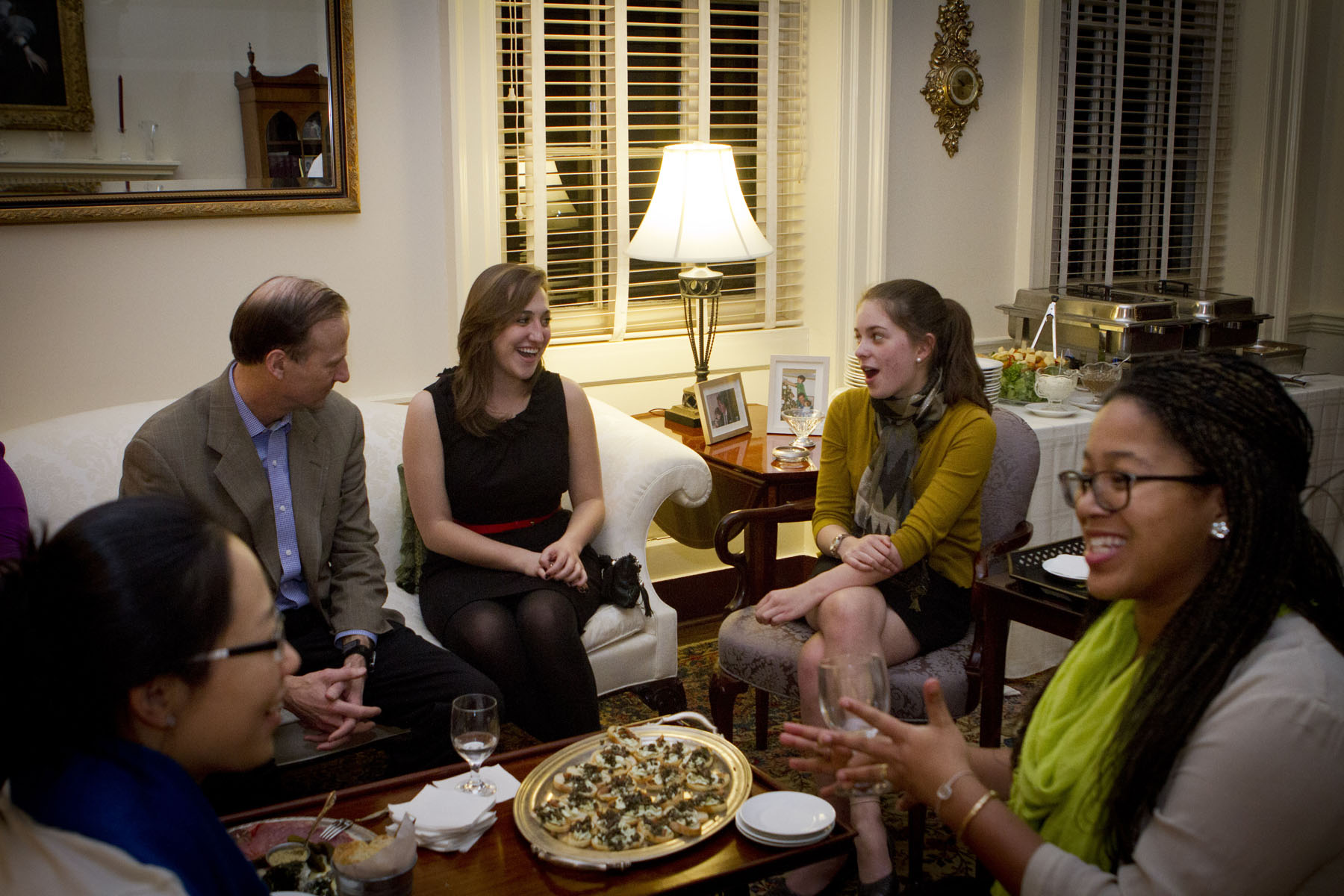Friday evening, as the smell of wood smoke filled the cold air, students, administrators and members of the University of Virginia’s Board of Visitors gathered in pavilions dotting the Lawn for intimate dinners where the seats weren’t assigned but the topics were.
The brainchild of Hillary Hurd, the board’s student representative, the three so-called “Jeffersonian dinners” were a first attempt at bringing together students and board members for some serious conversation.
Topics were pre-assigned, as well as reading assignments. There were rules, too: Attendees should avoid “side conversations” with tablemates and stay on topic.
Sound rigid? You’d have been in good hands with moderator Benjamin Bissell, a fourth-year in the College of Arts & Sciences double-majoring in honors politics and Russian literature with a minor in Middle Eastern languages.
His dinner topic was how global affairs at U.Va. can serve the commonwealth. Vice Provost for Global Affairs Jeffery W. Legro, Vice Rector George Keith Martin and BOV member Victoria D. Harker joined students ranging from first-years to graduate students.
The atmosphere was casual, with attendees serving themselves and gathering at a single large table in the dining room of Pavilion VI. To break the ice, Bissell asked each guest to share one thing they were glad their parents did not let them do. The mood lightened as each person took his or her turn. One student said she was glad her parents would not allow her to go to a movie until she had first read the book upon which it was based. Another said her parents allowed her to take risks, instilling in her a “can-do” attitude for which she was grateful.
The conversation then turned to global affairs. Everyone agreed it was vital that U.Va. continue to deepen its international efforts and there was debate on how best to do that. Some students wondered if U.Va. should have branches in other countries. Others said it was important to continue to diversify the student body and increase opportunities for study abroad.
“It’s definitely an enculturation process. It’s important that we teach more undergraduate and graduate courses that are more internationally based or international in nature,” said Gwen Cassady, a graduate student in the Curry School of Education, who also advocated for mandatory foreign language and study-abroad programs.
“We are going to have to learn more languages,” said Martin, who shared the story of a friend he visited in South Africa in June who speaks seven languages. “And the driver that we had spoke 11 languages because he works in a hotel, so he’s interacting with people from all over the world.”
Harker offered a cautionary story about the importance of appreciating cultural differences. When she worked at former telecommunications company MCI in the early 1990s, Harker said the company had completed the launch of a new long-distance plan called “Friends Around the World Anytime.” What the company did not realize was the acronym was “FATWA,” which is an opinion or ruling issued by an Islamic scholar. Fatwas have also been used to issue death threats, perhaps most famously in the late 1980s, when Iranian leader Ayatollah Ruhollah Khomeini issued one against author Salman Rushdie, whose novel “The Satanic Verses,” stoked anger among Muslims in several countries.
“Obviously, there were a lot of culturally unaware people working on this. It wasn’t just one person,” she said, underscoring that students today need to understand and appreciate differences in cultures. Lacking any context for how to go about screening for that kind of thing, Harker said, makes for a stiff learning curve for new graduates.
When the conversation shifted to how U.Va’s global affairs can serve the commonwealth, talk focused on the global nature of almost every industry, and how cultural and linguistic aptitude matter in today’s world.
Participants also noted that students and faculty members from every country and walk of life are creating networks that are benefitting the financial and academic nature of the University, Bissell said.
Hurd floated the Jeffersonian dinner idea at a board meeting in November and Martin responded positively. “I participated in a Jeffersonian dinner last year and it was very stimulating, so the opportunity to do it again, especially with students, was appealing to me,” he said.
President Teresa A. Sullivan and board members Allison Cryor DiNardo and Linwood H. Rose joined students in Pavilion IX to discuss undergraduate advising. Moderator Frances Russell a political and social thought major in the College, said most students felt as though they had learned a lot about career possibilities and academic paths from their professors and others, including teaching assistants and resident advisers. “The board members asked such questions as ‘Would it be helpful in choosing a major to have career salaries available?” she said.
The third dinner, in Pavilion V, included Executive Vice President and Chief Operating Officer Patrick Hogan, Rector Helen E. Dragas and Vice President and Chief Student Affairs Officer Patricia M. Lampkin. The topic of discussion was how to reconcile career planning with the liberal arts.
Moderator and political and social thought major Conor O’Boyle said students are finding job-hunting very stressful. “We agreed on some steps the University could take so U.Va. students can have more direction upon graduation,” he said.
“We thought a semi-institutionalized advising system to connect graduate and undergraduate students” would be helpful,” O’Boyle said.
Media Contact
Article Information
February 13, 2013
/content/uva-board-members-administrators-students-talk-big-ideas-intimate-dinners

